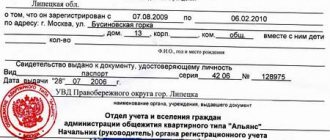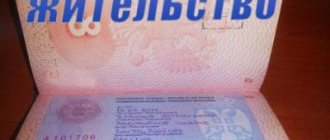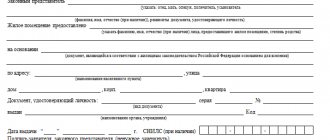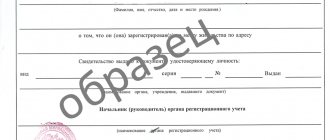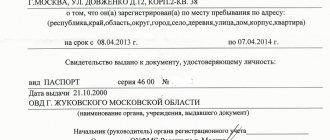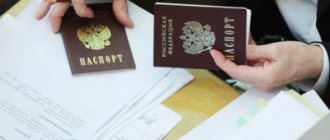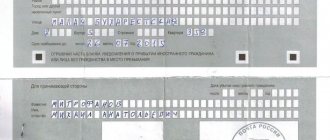Citizens certainly need to understand the terms found in regulations. Otherwise, a person simply does not understand what his rights and responsibilities are. A common case of confusion in deciphering concepts is the question of what differences exist between place of residence and place of registration. From this article you will learn what a place of stay and a place of residence are, what the difference is, how permanent and temporary registration differ, how to register correctly, what documents will be needed for permanent registration.
The concept of place of residence - what is a place of residence
Current Russian legislation allows citizens to move around the country as they please, however, there is a procedure according to which living outside a permanent place of residence is allowed for no more than 90 days - otherwise, they will have to contact the authorized bodies to obtain temporary registration at the place of residence.
So, a certain place in which a person is temporarily located for a period of time (less than 3 months without registration or more than 3 months with registration) is called the place of stay. This could be a hotel, a sanatorium-resort institution, a rented apartment, a recreation center, etc. Employees of enterprises such as hotels register visitors themselves, and in the case of rental housing, a person registers himself.
To inform the authorities that a person will temporarily reside in a place other than where he is registered on a permanent basis, you need to submit an application through the Main Department of Migration Affairs of the Ministry of Internal Affairs, the official website of the State Services or a multifunctional center. Employees of the institution will issue a certificate confirming the fact of applying for registration.
Application and responsibility
Now all this knowledge can be applied to reality.
Life without registration
A rented apartment is still a temporary residence address. By law, we can live there for three months without registering at our residence address. It's the same with guests. If you went to visit and stayed there for more than three months, then you need to register.
What if you, say, own two apartments? You are only allowed to register in one of them. What to do in this case?
According to the law, within 7 days after you arrive to permanently live somewhere, you must register there. That is, you need to register in the apartment where you permanently live.
Obviously, not every owner who rents out his apartment will want to register tenants there. And not everyone has the opportunity to register as a long-term guest. What consequences should you expect?
There is an article 19.15 in the Code of Administrative Offenses, according to which living without registration entails the imposition of an administrative fine in the amount of 2,000 to 3,000 rubles. In Moscow and St. Petersburg, fines are even higher - from 3,000 to 5,000 rubles.
In other words, registration at the place of residence for citizens of the Russian Federation is mandatory, as well as at a permanent address. If you live somewhere without registration (temporary or permanent), then you may be fined for this. But only if they prove that you live at this address permanently, and must be registered at your place of residence. Or that you have been living at this address temporarily, but for more than three months. And that means they must register.
How to prove this? Well, if the local police want, they have the right to interview, for example, neighbors who will say that you have been at this address every day and night (constantly) for a long time (more than three months).
Visiting another city
But here’s another situation: let’s say I’m registered in Moscow. And I decided to go to St. Petersburg. I'm walking down the street. And suddenly a policeman stops me and asks for my passport. And then, seeing that I have a Moscow residence permit, he asks about registration. But I don't have it.
What are the consequences? Yes, none. First of all, I am a citizen of the Russian Federation. And Article 27 of the Constitution of the Russian Federation states “Everyone who is legally present on the territory of the Russian Federation has the right to move freely, choose their place of stay and residence.” The same is stated in the law “On the right of citizens of the Russian Federation to freedom of movement, choice of place of stay and residence within the Russian Federation” No. 5242-1 of June 25, 1993. Article 1: “In accordance with the Constitution of the Russian Federation and international human rights instruments, every citizen of the Russian Federation has the right to freedom of movement...”.
Thus, any citizen of the Russian Federation has the right to stay on the territory of the Russian Federation without any permission to do so. And registration at the address of residence or stay has nothing to do with it. Maybe I just arrived yesterday. Or even two months ago. Prove that this is not so. We have a presumption of innocence, by the way. And secondly, the Code of Administrative Offenses says that being at the address of stay or residence without registration... And I have already given definitions to these terms above. As a citizen of the Russian Federation, they have no right to fine me for being on the street without registration.
The concept of place of residence - what is place of residence
So that citizens of the country can exercise their legal rights in the region in which they live, and also to know where a particular person lives on a permanent basis, a record of citizens is kept at their main place of residence. That is, the place of residence is the housing in which a person is constantly, most of the time. In such an apartment/house, this citizen must have permanent registration (a stamp indicating the presence of which is placed in the passport).
If a person moves to another area, he will have to be discharged from his permanent home and re-registered in the region where he is going. Permanent registration (until 1993 - registration) can be issued in residential premises such as an apartment, house, rented housing, dormitory, room, boarding school, service apartments.
The purpose of accounting for migration and registration
The country's federal laws oblige both citizens of the Russian Federation and visitors from other states and persons without citizenship to notify the migration authority of a change of location. This is required in order to control the flow of foreigners arriving in the country every day, as well as Russians actively moving around the territory of their state.
The main goal of migration registration, which is relevant for Russians and important for all visitors, is to provide people with the opportunity to use their freedoms and rights, fulfill obligations to the country, its society and compatriots.
In Russia, as in all other countries of the world, migration registration is the recording in documents of data about a citizen at the place of stay or residence. It is very important not to confuse these terms.
Watch the video: Registration rules.
Place of residence and place of registration, actual differences
The difference between place of residence and registration is as follows:
- place of stay is housing that is used by a person for temporary stay (for the period permitted by law), and there is a list of premises for temporary residence (these are recreation centers, sanatoriums, camps, etc.);
- place of residence is a residential premises in which a person is officially registered (until 1993 - registered), where he can be found at almost any time;
- place of actual residence - apartment/house where the citizen is actually located, despite the fact that he is registered in another premises.
Extracts from legislative and other normative legal acts regulating the provision of public services for registration of citizens of the Russian Federation at the place of stay and place of residence within the Russian Federation
I. The Constitution of the Russian Federation (adopted by popular vote on December 12, 1993 (with amendments approved during the all-Russian vote on July 1, 2020) (extract)
Article 27
1. Everyone who is legally present on the territory of the Russian Federation has the right to move freely, choose their place of stay and residence.
II. Law of the Russian Federation of June 25, 1993 No. 5242-I “On the right of citizens of the Russian Federation to freedom of movement, choice of place of stay and residence within the Russian Federation” (extract)
Article 1. The right to freedom of movement, choice of place of stay and residence within the Russian Federation
In accordance with the Constitution of the Russian Federation and international human rights acts, every citizen of the Russian Federation has the right to freedom of movement, choice of place of stay and residence within the Russian Federation.
Restrictions on the right of citizens of the Russian Federation to freedom of movement, choice of place of stay and residence within the Russian Federation are permitted only on the basis of law.
Persons who are not citizens of the Russian Federation and are legally located on its territory have the right to freedom of movement, choice of place of stay and residence within the Russian Federation in accordance with the Constitution and laws of the Russian Federation and international treaties of the Russian Federation.
Article 3. Registration of citizens of the Russian Federation at the place of stay and place of residence within the Russian Federation
In order to ensure the necessary conditions for a citizen of the Russian Federation to exercise his rights and freedoms, as well as to fulfill his duties to other citizens, the state and society, registration of citizens of the Russian Federation at the place of stay and at the place of residence within the Russian Federation is being introduced.
Citizens of the Russian Federation are required to register at their place of stay and place of residence within the Russian Federation. Registration or lack thereof cannot serve as a basis for restriction or a condition for the implementation of the rights and freedoms of citizens provided for by the Constitution of the Russian Federation, federal laws, constitutions (charters) and laws of the constituent entities of the Russian Federation.
Article 5. Registration of a citizen of the Russian Federation at the place of stay and deregistration of a citizen of the Russian Federation at the place of stay
Registration of a citizen of the Russian Federation at the place of residence is carried out within a period not exceeding 90 days from the date of arrival of the citizen in the residential premises. Registration at the place of residence is carried out without removing the citizen from registration at the place of residence.
Article 6. Registration of a citizen of the Russian Federation at the place of residence
A citizen of the Russian Federation who has changed his place of residence is obliged, no later than seven days from the date of arrival at his new place of residence, to contact the person responsible for receiving and transferring to the registration authorities documents for registration and deregistration of citizens of the Russian Federation at the place of stay and at the place of residence. residence within the Russian Federation, or to the registration authority with an application in the prescribed form.
The application, as well as the documents necessary for the provision of public services, can be submitted in the form of electronic documents and sent to the registration authority using public information and telecommunication networks, including the Internet, including the Unified Portal of State and Municipal Services.
The registration authority is obliged to register a citizen at the place of residence no later than three days from the date of presentation of documents (submitting an application and documents in the form of electronic documents) for registration.
Article 7. Removal of a citizen of the Russian Federation from registration at the place of residence
Removal of a citizen of the Russian Federation from registration at the place of residence is carried out by the registration authority in the following cases:
change of place of residence - based on a citizen’s application in writing or in the form of an electronic document on registration at a new place of residence;
recognition as missing - on the basis of a court decision that has entered into legal force;
death or declaration of death by a court decision - on the basis of a death certificate issued in the manner prescribed by law;
eviction from occupied residential premises or recognition as having lost the right to use residential premises - on the basis of a court decision that has entered into legal force;
discovery of untrue information or documents that served as the basis for registration, or unlawful actions of officials when resolving the issue of registration - on the basis of a court decision that has entered into legal force;
identification of the fact of fictitious registration of a citizen of the Russian Federation at the place of residence - on the basis of a decision of the registration authority adopted in the manner established by the federal executive body in the field of internal affairs.
Article 8. Grounds for restricting the right of citizens of the Russian Federation to freedom of movement, choice of place of stay and residence within the Russian Federation
The right of citizens of the Russian Federation to freedom of movement, choice of place of stay and residence within the Russian Federation in accordance with the laws of the Russian Federation may be limited:
in the border zone;
in closed military camps;
in closed administrative-territorial entities;
in areas of environmental disaster;
in certain territories and in populated areas, where in case of danger of the spread of infectious and mass non-infectious diseases and poisoning of people, special conditions and regimes for the population’s residence and economic activity have been introduced;
in territories where a state of emergency or martial law has been declared.
III. Decree of the Government of the Russian Federation of July 17, 1995 No. 713 “On approval of the Rules for registration and deregistration of citizens of the Russian Federation at the place of stay and place of residence within the Russian Federation and the list of persons responsible for the reception and transfer of documents to the registration authorities for registration and deregistration of citizens of the Russian Federation at the place of stay and place of residence within the Russian Federation"
These Rules, in accordance with the Constitution of the Russian Federation, the Law of the Russian Federation “On the right of citizens of the Russian Federation to freedom of movement, choice of place of stay and residence within the Russian Federation”, housing, civil and other legislation of the Russian Federation regulate the procedure for registration and removal of citizens of the Russian Federation from registration at the place of stay and place of residence within the Russian Federation.
Registration is established in order to provide the necessary conditions for citizens to exercise their rights and freedoms, as well as to fulfill their duties to other citizens, the state and society.
The registration authorities in cities, towns, rural settlements, closed military camps, as well as in settlements located in the border zone or closed administrative-territorial entities are the territorial bodies of the Ministry of Internal Affairs of the Russian Federation.
Violation of the requirements of these Rules entails liability for citizens, tenants (owners) of residential premises, officials and persons responsible for receiving and transferring documents to registration authorities, in accordance with the legislation of the Russian Federation.
Registration of citizens at the place of stay (clause 9).
Citizens who arrive for temporary residence in residential premises that are not their place of residence for a period of more than 90 days are required, before the expiration of the specified period, to contact the persons responsible for receiving and transferring documents to the registration authorities and submit:
identification document;
application in the established form for registration at the place of residence;
a document that serves as the basis for a citizen’s temporary residence in the specified residential premises.
In the case of registration at the place of residence on the basis of a social tenancy agreement for residential premises concluded in accordance with the housing legislation of the Russian Federation, or a certificate of state registration of the right to residential premises, a citizen has the right not to present these documents, but only indicate in the application for registration at the place of residence their requisites.
In this case, the registration authority independently requests from state bodies, local government bodies information about the documents specified in paragraph five of this paragraph, and registers the citizen at the place of residence no later than 8 working days from the date of submission of the application for registration at the place of residence and the document identification document in accordance with the legislation of the Russian Federation.
Citizens have the right to notify the registration authority about the duration and place of their stay by mail or in electronic form using public information and telecommunication networks, including the Internet, including the federal state information system “Unified portal of state and municipal services (functions).”
Registration authorities are obliged to register a citizen no later than 8 working days from the date the citizen submits an application for registration at the place of residence and other documents necessary for such registration in electronic form in the case provided for in paragraph eight of this paragraph.
Registration of citizens at place of residence (clause 16)
A citizen who has changed his place of residence is obliged, no later than 7 days from the date of arrival at his new place of residence, to contact the persons responsible for receiving and transferring documents to the registration authorities and submit:
identification document;
application in the established form for registration at the place of residence;
a document that, in accordance with the housing legislation of the Russian Federation, is the basis for moving into a residential premises.
A citizen has the right not to present a document that is the basis for the citizen to move into a residential premises (social tenancy agreement, rental agreement for residential premises of a state or municipal housing stock, a state-registered agreement or other document expressing the content of a real estate transaction, a certificate of state registration of the right to residential premises or other document), if the information contained in the relevant document is at the disposal of state bodies or local governments. In this case, the registration authority independently requests from state bodies, local government bodies the relevant document (information contained in it), an extract from the relevant register, other information in accordance with the legislation of the Russian Federation and registers the citizen at the place of residence no later than 8 working days from the date of submission of an application for registration at the place of residence and an identification document in accordance with the legislation of the Russian Federation.
An application in the established form for registration at the place of residence in the form of an electronic document, as well as copies of the documents specified in this paragraph, in electronic form can be submitted through the Unified Portal of State and Municipal Services (functions).
Citizens are considered deregistered at the place of stay in residential premises that are not their place of residence upon expiration of the deadlines specified in their applications for registration at the place of stay.
If a citizen fails to submit an application in the prescribed form and other documents to the registration authority for registration at the place of stay or place of residence within the period established by the legislation of the Russian Federation, the tenant (owner) of the residential premises in which the citizen lives, after the expiration of the period established by the legislation of the Russian Federation deadline, the registration authority notifies within 3 working days of the citizen’s residence in the specified residential premises in the form according to the appendix.
The tenant (owner) of residential premises has the right to notify the registration authority about the period and place of residence of a citizen without registration in person, by mail or electronically using public information and telecommunication networks, including the Internet, including the Unified Portal.
Violation of the deadline for notifying the registration authority about the residence of a citizen without registration entails the responsibility of the tenant (owner) of the residential premises in accordance with the legislation of the Russian Federation.
List of persons responsible for receiving and transmitting to the registration authorities documents for registration and deregistration of citizens of the Russian Federation at the place of stay and at the place of residence within the Russian Federation:
officials of state authorities of the Russian Federation in the field of housing relations, state authorities of the constituent entities of the Russian Federation in the field of housing relations, local government bodies in the field of housing relations, holding permanently or temporarily positions related to the implementation of organizational, administrative or administrative responsibilities for control for compliance with the rules for the use of residential premises of the state and municipal housing stock;
owners who independently manage their residential premises, or authorized persons of a homeowners’ association or housing management organization;
authorized persons of management bodies of housing and housing-construction cooperatives;
authorized officials of multifunctional centers for the provision of state (municipal) services.
IV. Order of the Ministry of Internal Affairs of Russia dated December 31, 2021 No. 984 “On approval of the Administrative Regulations of the Ministry of Internal Affairs of the Russian Federation for the provision of public services for registration of citizens of the Russian Federation at the place of stay and place of residence within the Russian Federation”
The administrative regulations of the Ministry of Internal Affairs of the Russian Federation for the provision of public services for registration of citizens of the Russian Federation at the place of stay and place of residence within the Russian Federation determine the timing and sequence of administrative procedures (actions) of divisions on migration issues of the territorial bodies of the Ministry of Internal Affairs of Russia at the regional and district levels (including migration divisions of police departments (branches, points) of territorial bodies of the Ministry of Internal Affairs of Russia at the district level), as well as the procedure for their interaction with territorial bodies of federal executive authorities, executive authorities of constituent entities of the Russian Federation, local government bodies, persons responsible for the reception and transmission to the registration authorities of documents for registration and deregistration of citizens of the Russian Federation at the place of stay and place of residence within the Russian Federation, when providing state services for registration and deregistration of citizens of the Russian Federation at the place of stay and at the place of residence within the Russian Federation.
The public service is provided by the Ministry of Internal Affairs of the Russian Federation. Direct provision of public services is carried out by registration authorities.
Persons responsible for receiving and transmitting documents to registration authorities, multifunctional centers in the presence of an appropriate agreement on interaction, and organizations of federal postal services take part in the provision of public services.
The result of the provision of public services is the registration of a citizen at the place of residence with the affixing of a registration stamp at the place of residence of the established form in the passport of a citizen of the Russian Federation, identifying the identity of a citizen of the Russian Federation on the territory of the Russian Federation, the passport of a citizen of the USSR, identifying the identity of a citizen of the Russian Federation (before replacing it in established period for a passport of a citizen of the Russian Federation), or with the issuance of a certificate of registration at the place of residence in Form No. 8 for persons under 14 years of age.
The grounds for refusal to accept an application for registration and documents necessary for the provision of public services are:
violation of the established requirements for the form and content of the registration application, including if the text of the registration application is not legible;
lack of documents, the mandatory submission of which is provided for by the Administrative Regulations;
restrictions on freedom of movement, choice of place of stay and residence within the Russian Federation established in accordance with the legislation of the Russian Federation.
The basis for suspension of the provision of a public service is the failure of the applicant to appear within three calendar days after his invitation to an appointment with original documents, if the application for registration, application for deregistration at the place of residence or application for deregistration at the place of stay was submitted through the Unified portal.
V. Code of the Russian Federation on Administrative Offenses (extract)
Article 19.15.1. Residence of a citizen of the Russian Federation at the place of stay or at the place of residence in a residential building without registration
1. Residence of a citizen of the Russian Federation at the place of stay or at the place of residence in residential premises without registration, or permission of such residence by the tenant or owner of this residential premises beyond the time limits established by law -
entails the imposition of an administrative fine on citizens in the amount of two thousand to three thousand rubles; for tenants, owners of residential premises (individuals) - from two thousand to five thousand rubles; for legal entities - from two hundred and fifty thousand to seven hundred and fifty thousand rubles.
2. The violation provided for in Part 1 of this article, committed in the federal city of Moscow or St. Petersburg, -
entails the imposition of an administrative fine on citizens in the amount of three thousand to five thousand rubles; for tenants, owners of residential premises (individuals) - from five thousand to seven thousand rubles; for legal entities - from three hundred thousand to eight hundred thousand rubles.
Note. Citizens of the Russian Federation are exempt from administrative liability for an administrative offense provided for in this article in the following cases:
residence without registration at the place of residence in a residential premises located in the corresponding locality of a constituent entity of the Russian Federation, if they are registered at the place of residence in another residential premises located in the same or another locality of the same constituent entity of the Russian Federation;
residence without registration at the place of residence in a residential premises located in the federal city of Moscow or in one of the populated areas of the Moscow region, if they are registered at the place of residence in a residential premises located in the federal city of Moscow or in one of the populated areas of the Moscow region;
residence without registration at the place of stay in a residential premises located in the federal city of St. Petersburg or in one of the populated areas of the Leningrad Region, if they are registered at the place of residence in a residential premises located in the federal city of St. Petersburg or in one of the populated areas points of the Leningrad region;
residence without registration at the place of stay in a residential premises located in the federal city of Sevastopol or in one of the populated areas of the Republic of Crimea, if they are registered at the place of residence in a residential premises located in the federal city of Sevastopol or in one of the populated areas of the Republic of Crimea;
if they are spouses, children (including adopted children), spouses of children, parents (including adopted), spouses of parents, grandparents or grandchildren of a tenant (owner) of a residential premises who is registered at the place of residence in this residential premises;
if the persons living together with the tenant or the owner of the residential premises are in relation to him spouses, children (including adopted children), spouses of children, parents (including adopted ones), spouses of parents, grandparents or grandchildren.
Article 19.15.2. Violation of the rules for registering a citizen of the Russian Federation at the place of stay or place of residence in a residential area
1. Violation of the rules for registering a citizen of the Russian Federation at the place of stay or at the place of residence in a residential building, if these actions do not contain signs of a criminal offense, shall entail the imposition of an administrative fine on citizens in the amount of two thousand to three thousand rubles; for tenants, owners of residential premises (individuals) - from two thousand to five thousand rubles; for officials - from twenty-five thousand to fifty thousand rubles; for legal entities - from two hundred and fifty thousand to seven hundred and fifty thousand rubles.
2. The violation provided for in Part 1 of this article, committed in the federal city of Moscow or St. Petersburg, entails the imposition of an administrative fine on citizens in the amount of three thousand to five thousand rubles; for tenants, owners of residential premises (individuals) - from five thousand to seven thousand rubles; for officials - from thirty thousand to fifty thousand rubles; for legal entities - from three hundred thousand to eight hundred thousand rubles.
3. Violation, without good reason, by the tenant or owner who provided residential premises to a citizen of the Russian Federation, of the deadlines established by the legislation of the Russian Federation for notifying the registration authority about the residence of this citizen in the specified residential premises without registration, or submitting to the registration authority obviously false information about the registration of a citizen of the Russian Federation if these actions do not contain signs of a criminal offense - entail the imposition of an administrative fine on citizens in the amount of two thousand to three thousand rubles; for legal entities - from four thousand to seven thousand rubles.
4. The violation provided for in Part 3 of this article, committed in the federal city of Moscow or St. Petersburg, entails the imposition of an administrative fine on citizens in the amount of three thousand to five thousand rubles; for legal entities - from seven thousand to ten thousand rubles.
5. Violation by the person responsible for receiving and transferring to the registration authority documents for registration and deregistration of a citizen of the Russian Federation at the place of stay and place of residence within the Russian Federation of the deadlines established by the legislation of the Russian Federation for submitting documents for registration to the registration authority citizens of the Russian Federation or submitting knowingly false documents to the registration authority for registration of a citizen of the Russian Federation, if these actions do not contain signs of a criminal offense, shall entail the imposition of an administrative fine in the amount of three thousand to five thousand rubles.
Notes:
1. Citizens of the Russian Federation are exempt from administrative liability for violating the rules for registering a citizen of the Russian Federation at the place of stay or at the place of residence in a residential building if they provide documented information that they are spouses, children (including adopted children), spouses of children, parents (including adopted ones), spouses of parents, grandparents, grandchildren of tenants (owners) of residential premises who are registered at the place of residence in this residential premises.
2. The tenant (owner) of a residential premises is exempt from administrative liability for violation of the deadlines established by the legislation of the Russian Federation for notifying the registration authority about the residence of a citizen of the Russian Federation in the specified residential premises without registration in the case of:
submission by such a citizen of documented information about his registration at the place of residence in another residential premises located in the same or another locality of the same subject of the Russian Federation;
residence of a citizen of the Russian Federation in a residential premises located in the federal city of Moscow or in one of the populated areas of the Moscow region, if he is registered at the place of residence in a residential premises located in the federal city of Moscow or in one of the populated areas of the Moscow region;
residence of a citizen of the Russian Federation in a residential premises located in the federal city of St. Petersburg or in one of the settlements of the Leningrad region, if he is registered at the place of residence in a residential premises located in the federal city of St. Petersburg or in one of the settlements of the Leningrad region regions;
residence of a citizen of the Russian Federation in a residential premises located in the federal city of Sevastopol or in one of the populated areas of the Republic of Crimea, if he is registered at the place of residence in a residential premises located in the federal city of Sevastopol or in one of the populated areas of the Republic of Crimea.
VI. Civil Code of the Russian Federation (extract)
Article 14. Self-defense of civil rights
Self-defense of civil rights is allowed.
Methods of self-defense must be proportionate to the violation and not go beyond the actions necessary to suppress it.
Article 246. Disposal of property in shared ownership
1. The disposal of property in shared ownership is carried out by agreement of all its participants.
2. A participant in shared ownership has the right, at his own discretion, to sell, donate, bequeath, pledge his share or dispose of it in any other way, subject to the rules provided for in Article 250 of this Code during its alienation for compensation.
Article 247. Possession and use of property in shared ownership
1. Possession and use of property in shared ownership is carried out by agreement of all its participants, and if no agreement is reached, in the manner established by the court.
2. A participant in shared ownership has the right to be given for his possession and use a part of the common property commensurate with his share, and if this is not possible, he has the right to demand appropriate compensation from other participants who own and use the property falling on his share.
VII. Family Code of the Russian Federation (extract)
Article 54. The right of the child to live and be raised in a family.
1. A child is a person who has not reached the age of eighteen years (the age of majority).
2. Every child has the right to live and be raised in a family, as far as possible, the right to know his parents, the right to their care, the right to live together with them, except in cases where this is contrary to his interests.
Children living in the same family and having a common place of residence have the right of priority admission to study in basic general educational programs of preschool education and primary general education in state and municipal educational organizations in which their brothers and (or) sisters study.
A child has the right to be raised by his parents, education, to ensure his interests, comprehensive development, and respect for his human dignity.
In the absence of parents, in the event of deprivation of their parental rights and in other cases of loss of parental care, the child’s right to be raised in a family is ensured by the guardianship and trusteeship authority in the manner established by Chapter 18 of this Code.
Article 66. Exercise of parental rights by a parent living separately from the child.
1. A parent living separately from the child has the right to communicate with the child, participate in his upbringing and resolve issues regarding the child’s education.
The parent with whom the child lives should not interfere with the child’s communication with the other parent, if such communication does not harm the child’s physical and mental health or his moral development.
2. Parents have the right to enter into a written agreement on the procedure for exercising parental rights by a parent living separately from the child.
If the parents cannot come to an agreement, the dispute is resolved by the court with the participation of the guardianship and trusteeship authority at the request of the parents (one of them). At the request of the parents (one of them) in the manner established by civil procedural legislation, the court, with the obligatory participation of the guardianship and trusteeship authority, has the right to determine the procedure for the exercise of parental rights for the period before the court decision enters into legal force.
3. In case of failure to comply with a court decision, the measures provided for by the legislation on administrative offenses and the legislation on enforcement proceedings are applied to the guilty parent. In case of malicious failure to comply with a court decision, the court, at the request of a parent living separately from the child, may make a decision to transfer the child to him based on the interests of the child and taking into account the opinion of the child.
4. A parent living separately from the child has the right to receive information about his child from educational organizations, medical organizations, social service organizations and similar organizations. The provision of information may be refused only if there is a threat to the life and health of the child on the part of the parent. Refusal to provide information may be challenged in court.
VIII. Housing Code of the Russian Federation (extract)
Article 30. Rights and obligations of the owner of residential premises
1. The owner of a residential premises shall exercise the rights of ownership, use and disposal of the residential premises belonging to him by right of ownership in accordance with its purpose and the limits of its use, which are established by this Code.
2. The owner of residential premises has the right to provide possession and (or) use of residential premises belonging to him by right of ownership to a citizen on the basis of a lease agreement, an agreement for gratuitous use or on other legal grounds, as well as to a legal entity on the basis of a lease agreement or on other legal grounds taking into account the requirements established by civil legislation and this Code.
3. The owner of a residential premises bears the burden of maintaining this premises and, if this premises is an apartment, the common property of the owners of the premises in the corresponding apartment building, and the owner of a room in a communal apartment also bears the burden of maintaining the common property of the owners of the rooms in such an apartment, unless otherwise provided by the federal law or contract.
4. The owner of a residential premises is obliged to maintain the premises in proper condition, preventing mismanagement of them, to comply with the rights and legitimate interests of neighbors, the rules for the use of residential premises, as well as the rules for maintaining the common property of the owners of premises in an apartment building.
5. The owner of a residential building or part of a residential building is obliged to ensure the management of municipal solid waste by concluding an agreement with the regional operator for the management of municipal solid waste. For the purposes of this Code and other acts of housing legislation, the management of solid municipal waste means the transportation, neutralization, and burial of solid municipal waste.
Article 70. The right of the tenant to move other citizens into the residential premises he occupies under a social tenancy agreement as members of his family.
1. The tenant, with the written consent of his family members, including temporarily absent family members, has the right to move into the residential premises he occupies under a social tenancy agreement his spouse, his children and parents, or with the written consent of his family members, in including temporarily absent members of his family, and the landlord - other citizens as members of his family living with him. The landlord may prohibit the move-in of citizens as family members living with the tenant if, after their move-in, the total area of the relevant residential premises per family member is less than the accounting norm. The consent of the other members of the tenant's family and the consent of the landlord are not required to move in with the parents of their minor children.
2. Moving into residential premises of citizens as members of the tenant’s family entails a change in the relevant social tenancy agreement for residential premises in terms of the need to indicate in this agreement a new member of the tenant’s family.
Place of residence and place of stay - differences between the concepts
Let's compare the definitions of the concepts of place of registration and residence and take a closer look at what the difference is:
| Comparison criterion | Location | Place of stay |
| Duration of stay | A citizen resides in the premises on a permanent basis | The person lives in the premises for a short period of time |
| Registration | The tenant himself applies to the authorized bodies for registration | Registration is carried out by employees of the institution (except for the situation with rented housing) |
| Type of residential property | Individual house, apartments, service housing, shelters, boarding houses, boarding schools, hostels, homes for the elderly. | Hotel, sanatorium, recreation center, rented apartment, hospital, housing for relatives. |
| Documents confirming registration | Stamp on ID card (passport) | Help (certificate) |
How to confirm actual residence
First of all, you need to submit an application to the authorized body . Most often, this is necessary to exercise social rights, for example, to receive a pension, preferential payments, and health care.
Often the need for confirmation is a necessity for litigation regarding the collection of utility bills and other disputes. There are three ways to confirm your place of actual residence:
- Provide a rental or social tenancy agreement.
- Recourse to the testimony of witnesses, for example, neighbors in the building.
- Take supporting data from the house register and other documents.
Difference between permanent and temporary registration
A person obtains permanent registration in the housing where he lives permanently (the registration period is not limited), and temporary registration is needed if he stays in another place for a period exceeding 90 days.
Proof of permanent registration is a stamp on the front page of the passport, and temporary registration is an insert indicating the day of arrival and the end date of the time spent in the said premises. Permanent registration can be canceled only at the request of the tenant himself or by a court decision, and temporary registration ends automatically upon expiration of the period specified in the certificate.
Important! If the need arises, temporary registration is allowed to be extended - this is the only way to legally continue to stay in temporary housing for an additional period.
Temporary registration makes it clear to the authorized bodies that the citizen is at his actual place of residence. But permanent registration makes it possible to exercise more rights:
- to participate in the privatization of residential premises;
- to operate an apartment/house at will;
- to register a spouse, children, and relatives in the living space.
Features of migration registration
Migration registration actions are always aimed at recording in documents foreigners or persons who do not have citizenship who came to the Russian Federation.
Russian law states that this type of accounting is for notification purposes only. The exception is situations identified in constitutional and federal law.
Deadlines for foreigners to register
The main law regulating the registration procedure for foreign guests is Federal Law 109.
According to Russian legislation, all foreigners entering the state and intending to stay in it for more than a week are required to notify the Federal Migration Service of their arrival within seven days. Information about the arrival is entered into the database of the migration authority.
Watch the video: When should a foreign citizen register for migration in the Russian Federation?
Those who break the rules will face fines and deportation.
Important: two concepts that are often confused apply to foreign citizens living in Russia: migration registration and temporary registration.
Migration registration and temporary registration
Migration registration is a notification of arrival submitted to the relevant service. A form for notification of the arrival of a foreign citizen is available.
Sample of a detachable part of a notice of arrival of a foreign citizen
Temporary registration is a registration that foreigners usually do after receiving a temporary residence permit.
This is what temporary registration looks like
Registration of foreign citizens can be carried out at the place of stay or residence. You should contact the local authority of the Ministry of Internal Affairs of the Russian Federation operating in the area where the premises to which the applicant will be assigned are located.
The host party or the guest himself can contact the migration service. You can submit your application as follows:
- Personally.
- Russian Post.
- Through the state portal class=”aligncenter” width=”763″ height=”435″[/img]
You can submit an application to the migration service through the state services portal
Important: registration always presupposes the presence of a living space where the registrant will live.
Registered foreigners have the right to stay in the Russian Federation for the duration of their visa. If a guest arrives from a visa-free country, he is required to leave the Russian Federation after 90 days from the date of entry. Foreign guests have the right to a longer stay in the country after receiving a temporary residence permit.
This is what a temporary residence permit looks like in the Russian Federation
The host
An important point in the registration procedure is the receiving party. The law defines who has the right to act in this role:
- Persons with Russian citizenship.
- Branches, government agencies, legal entities where the applicant lives or works.
- Foreigners living in the Russian Federation on the basis of a residence permit or temporary residence permit.
- Foreign citizens are highly qualified specialists who own living space located in Russia (for family members only).
- Hotel administrations.
What documents must be provided?
To register a foreign guest for housing in the Russian Federation, it is necessary to provide the migration authorities with a completed notification of a special form, including:
- Data from the passport of a foreign citizen.
- Information from the migration card.
Completed Russian migration card
- Information about the visa, if entry was based on it.
The receiving party must complete the notification. The documents listed above are not confiscated from the owner.
What documents are needed to obtain permanent registration?
Important! If a person decides to cancel his permanent registration (check out) to move to a new place of residence, he will have to prepare a certificate of absence of debts for utility services.
To register at your place of permanent residence, you must prepare a minimum package of documents, including:
- application for registration in residential premises;
- citizen's passport;
- a document confirming the existence of rights to move into an apartment/house (application from the owner of the property, an extract from a court decision, a certificate of ownership, a lease agreement).
Registration of Russians
Migration of Russians within the country is subject to accounting in the same way as change of location by foreigners or stateless persons.
According to the rules of migration legislation, those who change their fixed address or change their place of residence for a long period of time are required to notify government authorities about their new place. They are also required to leave their old location.
You can re-register as follows:
- Appearing in person at the registration service.
- By sending a notification online using the municipal and government services portal.
- Through the services of the Russian Postal Department (only if the place of residence is registered).
How do you register at your place of residence?
If you change your place of residence, you must notify the local registration authorities about this within a week (seven calendar days) after moving.
You need to provide:
- Passport.
- A statement indicating that a change of residence has occurred.
- The paper based on which you moved into the living space declared as the new place of registration.
Sample application for registration at place of residence
The latter should be provided only in the case where information about the reasons for your relocation is not available from municipal or state authorities.
As a result, you will be deregistered at your previous place of residence.
How do you legally register at your place of residence?
If you have changed your place of residence for quite a long time (we are talking about exceeding the period of 90 days), in order not to break the law, you should contact the registration authorities with the following documents:
- Internal passport.
- A statement describing the situation and reasons.
- Justification in the form of documents indicating these reasons.
After reviewing the documentation provided, you will be issued a certificate giving you the right to temporarily live in a new place. Your fixation on the old will remain in force.
This is what a certificate of registration at the place of residence looks like
How are newborns registered?
A person born within Russia becomes its citizen from the date of his birth. Parents are required to register their child within the prescribed time frame. This is stated in the Law of the Russian Federation No. 5242-1. This document states that parents must notify the registry office about this within a month after the baby is born.
Then the new Russian must be registered with the registration authorities. This should be done within seven days after receiving the documents from the registry office.
If you ignore the requirements described above, parents will be fined in the amount of 2000–2500 rubles.
Watch the video: How to register a newborn baby.
How are citizens over 14 years of age registered?
Like kids, Russians who have already celebrated their 14th birthday, that is, older teenagers, are not responsible for the fact that they were not registered at their place of residence or stay.
Citizens responsible for minors before the law are required to register this category of persons.
>
Example of registration at the place of residence of a minor citizen
Expert opinion on the question of how to register correctly
Employees of the Main Department of Migration Affairs of the Ministry of Internal Affairs explain the procedure for registering at the place of permanent residence and temporary stay - the procedure is extremely simple, since a person can often exercise the basic rights of a citizen only if he has registration.
Currently, registration can be completed by contacting a department of the Main Department of Migration Affairs of the Ministry of Internal Affairs, a multifunctional center (the MFC sometimes requires even fewer documents than the Main Department of Migration Affairs of the Ministry of Internal Affairs), or by sending an application through the State Services website (pre-registration with identification confirmation is required).
Registration is completed within 3-5 days, after which a person can pick up a stamped passport. As for temporary registration, this can be done by the owner of a rental home or an employee of a sanatorium, recreation center, hotel and other residential complexes.
Legislative regulation
The concept of place of residence is given in Art. 2 of the Law of June 25, 1993 No. 5242-1. Before it came into force, the term “registration” was used, which was permanent and temporary. By analogy, registration at the place of residence is permanent.
The main purpose of registration of citizens on the territory of Russia is to provide them with the opportunity to move freely, while unhindered receipt of government services. Thus, the rights, freedoms and legitimate interests of every citizen of the Russian Federation are respected. For example, the possibility:
- employment;
- transfer of pensions and other social payments;
- receiving medical care;
- registering a child in a preschool or school institution;
- receiving social guarantees, etc.
Common mistakes
Error: A citizen came to another region of Russia on business and plans to stay away from his place of permanent registration for six months. He did not obtain temporary registration.
Comment: If a citizen plans to live outside the place of permanent registration for more than 90 days, he needs to contact the Main Department of Migration Affairs of the Ministry of Internal Affairs and register at the place of temporary residence (actual residence).
Error: A hotel guest is going to register at his place of permanent residence at the Main Migration Department of the Ministry of Internal Affairs.
Comment: Employees of hotels and other places of temporary stay will independently take care of the registration of the guest.
If the information is incorrect or entered with errors
As you know, an identity document with corrections, errors or incorrect data is invalid. Therefore, if the registration information was entered incorrectly by an employee, then under no circumstances should you correct it yourself. To do this, you should immediately go to the migration service department with an application for a replacement.
Registration in a passport at the place of residence or stay is necessary in both cases. It's important to do it. Properly executed documents provide a citizen with many rights, and also relieve them of legal penalties in the form of fines. In this connection, the accounting procedure must always be carried out in a timely manner and in compliance with all rules and laws.
If you find an error, please select a piece of text and press Ctrl+Enter.
